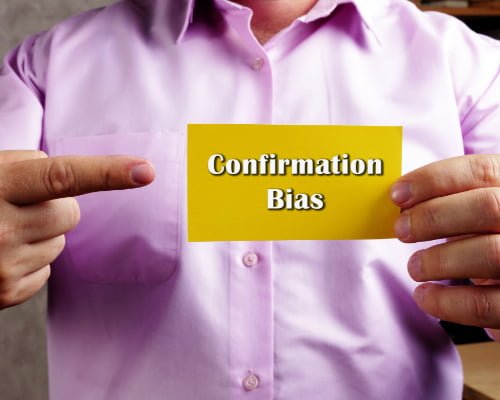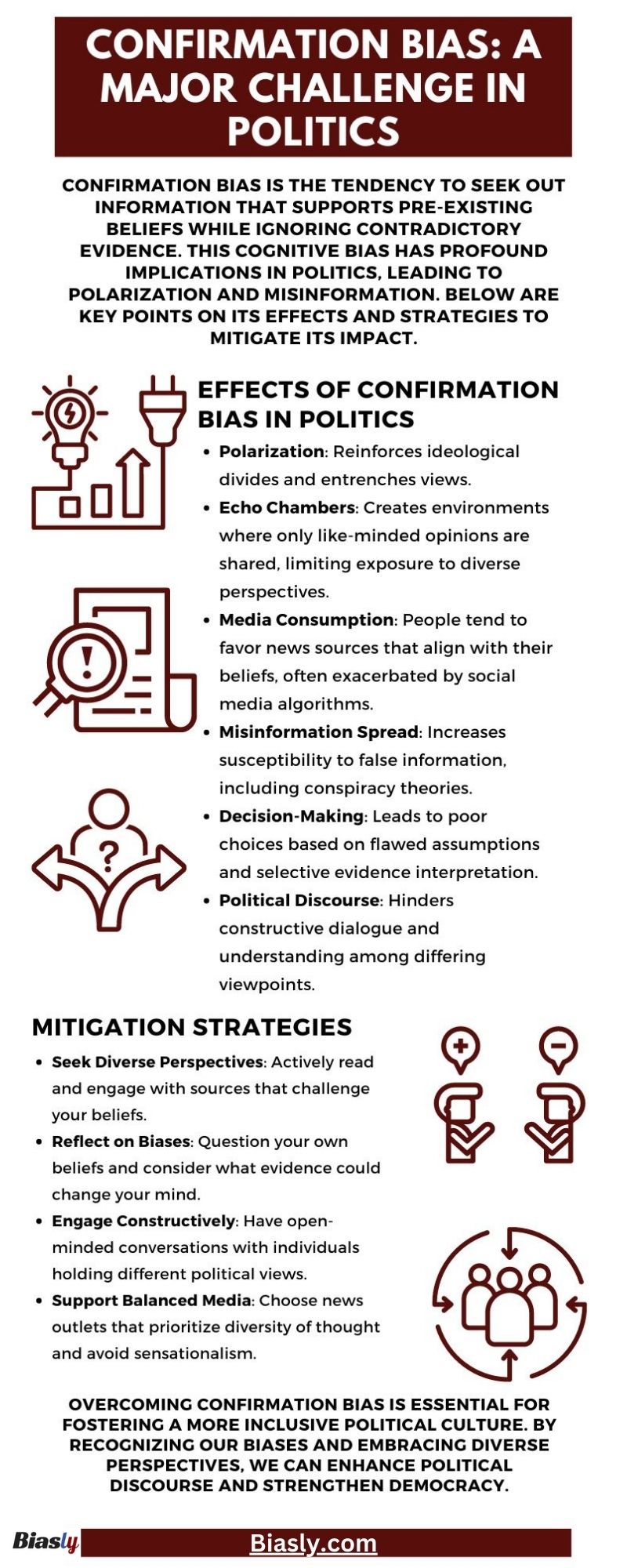
Confirmation bias is the tendency of people to seek and interpret information in ways that confirm their pre-existing beliefs or hypotheses. It is a type of cognitive bias that can affect our thinking, decision-making, and judgment. Confirmation bias can occur in any context but is particularly prevalent in politics.
This article will explore how confirmation bias affects politics and discuss ways to mitigate its impact. Confirmation bias is the tendency to interpret and seek out information that confirms our pre-existing beliefs while ignoring or dismissing information that contradicts them. In the realm of politics, confirmation bias can have significant consequences. It can lead people to believe in misinformation, reinforce existing biases, and prevent us from considering alternative perspectives.
Confirmation Bias and Polarization
Confirmation bias can contribute to political polarization, the increasing ideological divide between different societal groups. When people only seek information confirming their beliefs, they become less open to alternative perspectives and more entrenched in their views. This can lead to the formation of echo chambers, where people are surrounded by like-minded individuals and are exposed to only one side of an issue.
Confirmation bias affects politics in several ways. First, it can lead individuals to seek out news sources that confirm their pre-existing beliefs, creating an “echo chamber” effect.
Echo chambers can reinforce confirmation bias by creating a self-reinforcing cycle. When people are exposed only to information that confirms their beliefs, they become more convinced of their positions. This can lead to a sense of group identity, where people identify with their political views more than any other aspect of their identity. This can make it difficult to have constructive conversations with people who hold different political beliefs. People may surround themselves with like-minded individuals, consume news from outlets with similar political leanings, and avoid challenging their beliefs. This can lead to a reinforcement of existing biases and a need for exposure to alternative viewpoints.
Confirmation Bias and Media Consumption
Media consumption plays a significant role in shaping our political beliefs and attitudes. Many rely on news sources rather than seeking diverse perspectives to confirm their beliefs. Social media platforms use algorithms that reinforce this behavior by showing users content that aligns with their preferences. This can create a feedback loop where people are only exposed to information confirming their beliefs.
Additionally, confirmation bias can lead to the spread of misinformation. When people are only exposed to information that confirms their beliefs, they may be more likely to believe false or misleading information. This can lead to the spread of conspiracy theories and other forms of misinformation, which can have significant consequences for political discourse. To combat confirmation bias in politics, seeking out diverse perspectives and engaging in critical thinking is necessary.
Another way to gain access to a variety of perspectives is by subscribing to newsletters or news aggregators, such as Biasly.com. This can counteract the effects of confirmation bias by presenting a more diverse range of opinions and viewpoints. This means consuming news from various sources with different political leanings, questioning our pre-existing beliefs, and considering alternative viewpoints. It also means being open to constructive dialogue and conversing with people with different beliefs. This is a dangerous trend because people are less likely to be exposed to alternative viewpoints.
Tech companies’ use of big data and psychological manipulation to influence user behavior online raises the question about the limits of personal freedom. They may not even be aware that other perspectives exist. The machine learning algorithms expand upon the user’s internal rationale; the continual blasting of confirmational content would prevent that person from ever naturally changing their mind on a subject. They may use data and psychological insights to create persuasive messages. This can make it challenging to have productive conversations about political issues. When people are only exposed to information confirming their beliefs, they are less likely to question their assumptions or consider alternative viewpoints.
Confirmation Bias and Political Decision-Making
Confirmation bias can also affect political decision-making. When people are presented with information that confirms their beliefs, they are more likely to accept it as accurate, even if it is not supported by evidence. This can lead to poor decision-making, where decisions are made based on faulty assumptions or incomplete information. Confirmation bias can also affect the way that people interpret evidence.
People may selectively focus on evidence supporting their beliefs while ignoring evidence contradicting them. This can lead to a distorted view of reality, where people have a skewed understanding of the world around them. Confirmation bias can also affect political discourse by making it difficult to engage in constructive dialogue. When people are only exposed to information that confirms their beliefs, it can be challenging to consider alternative perspectives. This can make engaging in meaningful political conversations difficult, as people may become defensive and dismissive of opposing viewpoints.
How to Mitigate the Impact of Confirmation Bias
There are several ways to mitigate the impact of confirmation bias in politics. One approach is to seek out diverse perspectives. This means actively seeking out information and opinions that challenge our existing beliefs. We can do this by reading news sources with different views, attending events or forums where different viewpoints are presented, and engaging in conversations with people with different political beliefs.
Another approach is to be aware of our own biases. We can do this by reflecting on our beliefs and considering alternative viewpoints. We can ask ourselves, “Why do I believe this?” and “What evidence would it take to change my mind?” By being aware of our biases, we can be more open to alternative perspectives and more willing to question our assumptions.
Finally, we can engage in constructive conversations with people with different political beliefs. This means approaching these conversations with an open mind and a willingness to listen. We can understand why people have the opinions they do and look for areas of common ground. By engaging in respectful dialogue, we can create a more inclusive political culture that values the diversity of thought and opinion.
To overcome confirmation bias in politics, we must take proactive steps to seek out diverse perspectives, be aware of our biases, and engage in constructive conversations with people with different political beliefs. This requires a willingness to challenge our assumptions and be open to the possibility of being wrong. At the same time, we need to recognize that confirmation bias is a systemic issue that goes beyond individual behavior. The media, social media platforms, and political parties all have a role to play in creating a more inclusive political culture. They can do this by providing diverse perspectives, avoiding sensationalism, and promoting civil discourse.
Solutions to Prevent Confirmation Bias
As citizens, we are responsible for holding these institutions accountable and demanding that they promote diversity of thought and opinion. We can do this by supporting news sources, like Biasly, that provide the following:
- Diverse perspectives.
- Calling out sensationalism and bias when we see it.
- Engaging with political parties and candidates that prioritize civil discourse.
Overcoming confirmation bias requires a collective effort- something to help with this would be using the Media Rating List. We need to recognize that political polarization is not inevitable and that we can create a more inclusive political culture if we are willing to challenge our assumptions and engage in constructive conversations with people with different political beliefs. Doing so can build a more resilient and inclusive democracy that values diversity of thought and opinion.
Thus, confirmation bias is a significant challenge for politics but possible. We can create a more inclusive and constructive political discourse by being aware of our biases and actively working to overcome them.





























